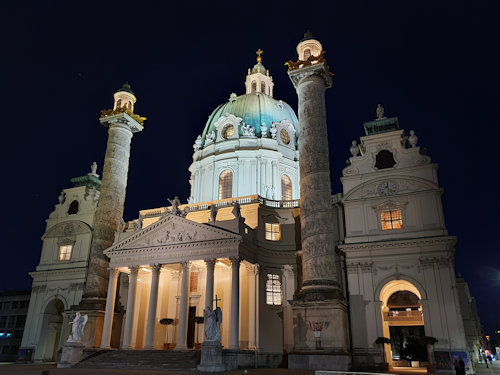
The common two-word response to that question in Vienna is smart casual. But for detail and depth, this article has a longer answer.
- Formal concert halls and special events may need more elegance
- Be sensitive to church venues
- Enjoy a classical concert* in Vienna
- See also:
Dress code or not?

(Vienna’s globally-renowned classical music venue: the Musikverein)
Curiously, venues and classical concert organisers tend not to have a detailed dress code in place.
For example, Vienna’s two most prestigious concert halls for classical music are the Musikverein and the Konzerthaus.
At the time of writing, the Musikverein simply requires clothing “appropriate to the occasion.” The Konzerthaus has no requirements, but does suggest that dressing for the occasion makes for a better experience.
The popular concerts in historical venues also refrain from specific dress codes. But you do see the words “smart casual” as regular recommendations for what to wear.
Which leaves us to ask just what “appropriate” and “smart casual” mean in practice? Here my advice…

(The Kursalon is another popular venue)
First off, three general guidelines:
- Apply the German word “gepflegt,” which we can translate as “of neat appearance”. So, for example, even if you’re wearing a t-shirt, it should not be one that looks like you just got off a 12hr flight in it.
- Avoid sportswear or beachwear like tank tops or flip flops. (Not that Vienna has much call for beachwear)
- And, of course, check the website or ticket details for a concert for any guidelines or requirements. Even if you find nothing specific, photos and videos should hint at what most people wear
Now, I’ve been to a couple of short evening concerts of light classical music designed for visitors to Vienna. Clothing among the audience ranged from shorts and t-shirt to the kind of clothes you’d wear to a formal cocktail evening at the embassy.
But my broad recommendation (and also my understanding of smart casual) is the same as for the opera: dress as if you were going for a nice evening out to a decent restaurant.
In my case, as a man, that means long trousers and a polo or shirt with buttons. Proper shoes or clean trainers.
Dress for the experience & occasion
Do feel free to dress up, of course. Classical music in Vienna is more than just classical music. It has a charm and delight to it as a continuation of an ingrained culture and tradition that dates back centuries.
And, of course, if you want to stay just “gepflegt casual” rather than “smart casual” that’s probably fine, especially for the more tourist-oriented performances rather than formal one-off concerts.
But I’d echo the Konzerthaus’s advice and suggest that making more of an effort only adds to the experience.
I would also go smart casual as a minimum to the Musikverein and Konzerthaus for their formal one-off classical concerts, where standards among the audience are higher than in the more ad hoc venues for light concerts. I’d probably dust off one of my sports jackets and hope it still fits.

(Venues like the Karlskirche, notable for its Vivaldi performances, are working churches)
At such locations, a t-shirt, for example, would not be “appropriate to the occasion” in my view. And you might attract questioning looks from other concert goers.
Special one-off events (like the New Year’s Concert), galas and similar may lift the standard further into the realms of black tie, evening dresses and even gowns. But these kind of events should always make their dress code clear.
A special word for church venues: as hinted at above, recent visits to the (wonderful) Peterskirche and Karlskirche concerts found audiences varying in their fashion choices from shorts and t-shirt up to notably smart casual.
However, these church venues are also working churches, so I’d urge a smart casual look where possible as a mark of respect for the ecclesiastical ambience. Equally, some churches can be hard to heat fully. So take that into account on cold winter evenings.
So…now you know what to wear, how about finding a suitable concert to attend?